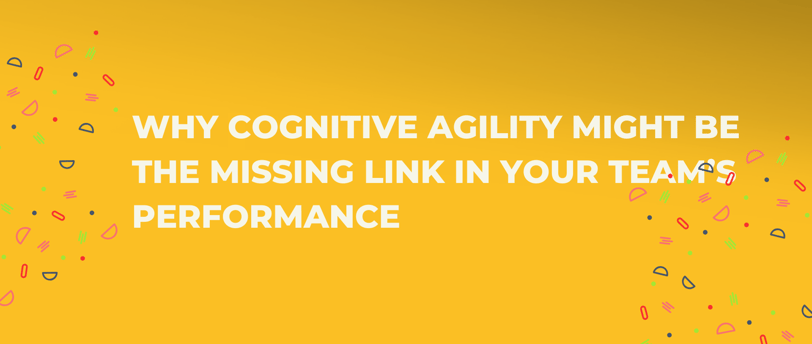Why Cognitive Agility Might Be the Missing Link in Your Team’s Performance
GENERAL
Yogita Chhaya
6/1/20253 min read


In today’s fast-paced workplace, most organizations focus heavily on hard skills, technology, and tools to drive results. And while these things are important, there’s another element—often overlooked—that quietly shapes how teams perform under pressure, navigate change, and come up with solutions when the usual methods stop working.
It’s called cognitive agility.
Simply put, cognitive agility is the ability to shift thinking quickly and effectively based on what’s happening in the moment. It’s how well someone can adapt their mental approach, consider multiple perspectives, unlearn outdated habits, and stay flexible in the face of uncertainty. In a world where 'business as usual' no longer exists, this skill set is not just valuable—it’s essential.
Let’s be honest. Most of us were trained to think in straight lines. We learn a process, repeat it, and stick to what works. This kind of consistency can be helpful—until things change. Then what?
Here’s the reality: change is constant. Market dynamics shift. Teams reorganize. Clients evolve. New technologies disrupt entire industries. In this environment, what worked last year—or even last month—might no longer apply.
That’s where teams run into trouble. People may resist new approaches because they’re mentally stuck in old patterns. They might shut down under pressure, avoid decisions, or double down on strategies that aren’t working. Not because they lack intelligence—but because they lack cognitive flexibility.
Cognitive agility shows up in those quiet, often invisible moments that can make or break a project:
A project manager recognizing that the original plan won’t work—and having the presence of mind to pivot without panic.
A leader who invites feedback from junior team members because they understand that solutions can come from anywhere.
A sales executive adjusting their pitch mid-meeting after noticing a shift in the client’s mood or interests.
A team that redefines success metrics when external conditions change, instead of forcing outdated KPIs.
These aren’t soft moments. These are business-critical skills.
Let’s consider the workforce dynamics today. We’re juggling hybrid teams, generational differences, digital transformation, and constant market pressure—all at once. Technical knowledge will only take you so far if your people can't think on their feet, shift perspectives, and navigate change constructively.
Organizations that thrive in this environment aren’t just faster or more tech-savvy—they’re more mentally agile. Their people know how to reframe problems, explore alternative paths, and recover quickly from setbacks.
That’s not just a “nice to have.” That’s a competitive edge.
Absolutely. While some people may naturally be more adaptable, cognitive agility is a skill that can be developed—just like communication, leadership, or negotiation.
The key is training the thinking process, not just the knowledge. This involves:
Awareness Training – Helping people recognize their own thinking patterns, biases, and blind spots.
Perspective Shifting – Practicing how to “stand in someone else’s shoes” and consider problems from multiple angles.
Scenario Flexing – Building comfort with ambiguity through real-time decision-making simulations.
Mental Recovery – Strengthening the ability to bounce back from cognitive overload or failure.
Reframing Habits – Teaching people how to see challenges not as roadblocks, but as data points.
In my workshops, we use real-world scenarios from participants' industries, so the learning feels immediate, relevant, and practical. The goal isn’t to add more theory—it’s to build the muscle memory of mental adaptability.
Teams with high cognitive agility don’t just cope better—they perform better.
Decision-making improves: Agile thinkers can assess risks faster and with greater clarity.
Collaboration gets easier: People become more open to new ideas and less attached to being “right.”
Stress levels drop: When people trust their ability to adapt, they approach change with curiosity instead of fear.
Innovation increases: With a more flexible mindset, teams are more willing to experiment and iterate.
Client relationships grow stronger: Adaptive teams can read situations better, communicate more clearly, and respond to needs in real time.
And perhaps most importantly, people feel empowered. They stop waiting for direction and start thinking like leaders—at every level of the organization.
If you’re in charge of talent development, you’ve probably noticed this: technical training gets more investment, but behavior-based training drives long-term performance.
Cognitive agility training doesn’t require months of classroom time. In fact, some of the most effective shifts happen through short, high-impact sessions that blend reflection, group dialogue, and scenario-based learning.
What matters is consistency. Give people the tools to think better, and you’ll see the ripple effects across productivity, morale, and innovation.
The business world rewards those who adapt, not just those who know. And while tools and processes will continue to evolve, the ability to shift your mindset—quickly, wisely, and with intention—is what sets great teams apart.
Cognitive agility is no longer a “soft” skill. It’s a power skill.
If you’re looking to future-proof your team, reduce resistance to change, and build a culture that thrives under pressure—start here.
Let’s Build Mental Flexibility Into Your Organization
If this resonates with you, I’d love to chat. I offer tailored cognitive agility workshops for leadership teams, departments, or entire organizations. Whether it’s a one-off session or part of a broader development program, let’s build a smarter, more adaptive workforce—one mindset at a time.
Yogita Chhaya
Atlassian Tools & Soft Skills Trainer
© 2025 Yogita Chhaya. All rights reserved.


Designed & Maintained by VP Internationals
